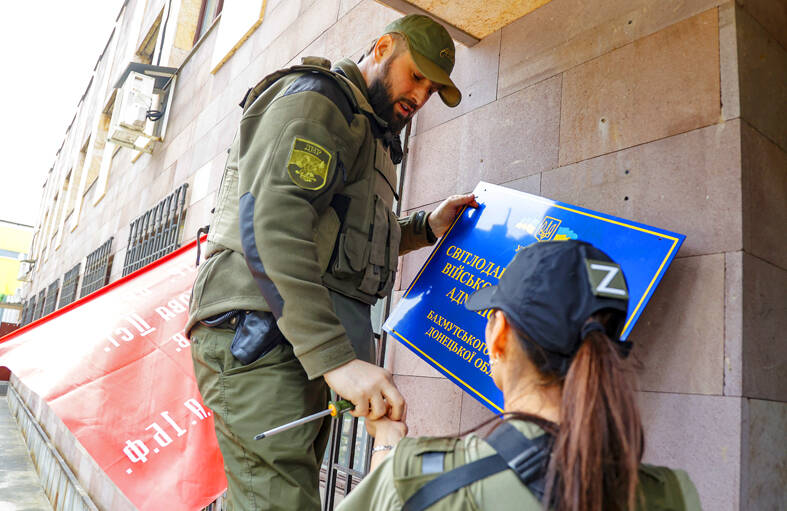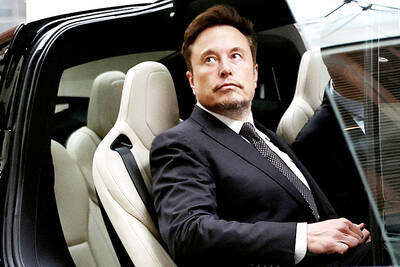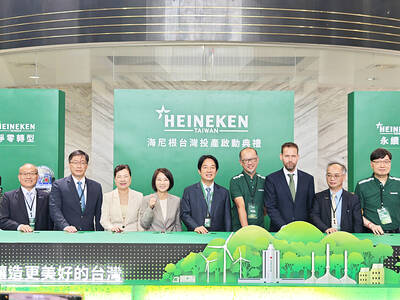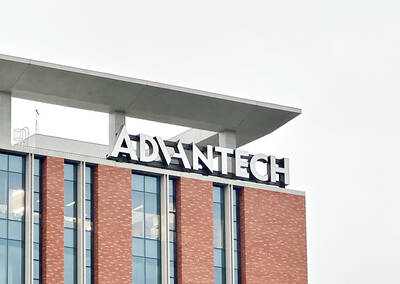A Chinese company bought at least US$7.4 million worth of copper alloy ingots from a plant in a Russian-annexed region of Ukraine that is subject to Western sanctions, Russian customs data showed.
China has not imposed any restrictions on trade with Russia, but the US has threatened to blacklist companies round the world for contravening its sanctions and warned Beijing against supplying Moscow with goods banned by US export rules.
The customs information, drawn from one commercial trade data provider and cross-checked with two others, shows some of the first evidence of Chinese trades with Russian-annexed regions of Ukraine since the war began on Feb. 24 last year.

Photo: EPA-EFE
The Chinese firm, Quzhou Nova Import and Export Co (衢州囡囡進出口), bought at least 3,220 tonnes of copper alloy in ingots worth a total of US$7.4 million from the Debaltsevsky Plant of Metallurgical Engineering between Oct. 8 last year and March 24, the data showed.
The plant is in Debaltseve in the Donetsk region of eastern Ukraine, close to the border with Luhansk. Donetsk and Luhansk were among four Ukrainian regions that Russian President Vladimir Putin claimed in September last year as part of Russia.
Quzhou Nova, a trading and manufacturing company based in Quzhou in the eastern province of Zhejiang, said it does not have any import and export business related to the trade of copper alloy in ingots.
When Reuters showed details of the exports in the customs data to Quzhou Nova, the company on March 23 said that it “finds hard to understand the document, because this document is not stamped and signed,” and suggested contacting customs about the issue.
The database, which collects information on all shipments worldwide, does not display stamps or signatures on its information.
The Chinese customs service did not provide detailed information on imports.
It said that “company trade data are not disclosed in our public information.”
China imported copper and copper alloys worth $852 million from Russia between October and February, according to public customs statistics.
A source at the Debaltsevsky plant, who spoke on the condition of anonymity, said there was a nonferrous metallurgy workshop on the territory of the factory.
The source declined to comment on the issue of copper alloy shipments to China, saying the information was a “trade secret.”
Contacted for comment, the Russian Federal Customs Service said that information on companies is confidential and is not disclosed by the service.
When asked about the matter on Friday, the Kremlin said it did not know whether information about the transaction was true or what proof was available.
It said it had no information about the subject itself.
The Debaltsevsky Plant did not respond to requests for comments by telephone and in writing.
Ukraine, its Western allies and an overwhelming majority of countries at the UN General Assembly have condemned Russia’s declared annexation of the four regions as illegal.
US sanctions imposed on Feb. 21 last year, three days before Russia invaded Ukraine, prohibit US imports from or exports to the so-called Donetsk and Luhansk People’s Republics.
Two days later, the EU announced measures including an import ban on goods from the two regions.
While Chinese companies are free as far as their authorities are concerned to trade with firms in Russian-controlled regions of Ukraine, they do risk being added to Western blacklists.
Asked about the copper shipments data, the US Department of State said it was concerned about Beijing’s alignment with Moscow.
“We have warned the PRC [People’s Republic of China] that assistance to Russia’s war effort would have serious consequences. We will not hesitate to move against entities, including PRC firms, that help Russia wage war against Ukraine or help Russia circumvent sanctions,” it said in a statement, listing some Chinese companies already sanctioned.
The European Commission did not respond to questions as to whether Chinese companies cooperated with the Russian-annexed Ukrainian territories and what risks such activity posed.
The Chinese Ministry of Commerce did not respond to requests for comment about the shipments of copper alloys from the Debaltsevsky Plant or cooperation with businesses in the Donetsk region.
The data is based on shipping and customs documents such as bill of lading and shipping bills, and were collected from several customs departments, government bodies and other partners.
Quzhou Nova says it specializes in the export of wrapping paper.
Its Web site says that it manufactures and trades goods for the tobacco industry, including paper, aluminum foil and polypropylene film.
Reuters could not establish what use the copper alloy was intended for.
The Ukrainian plant — 70km from the Russian-controlled Ukrainian city of Donetsk — specializes in making equipment and spare parts for ferrous metallurgy, the mining industry and cement plants, and has steelmaking and metal casting workshops, its Web site says.
Reuters was unable to find data about the financial state of the company. It was added to the Russian state tax register in December last year and has yet to report financial data.
According to a Ukrainian register, the legal status of the plant in Debaltseve has been suspended by the Ukrainian authorities. The register does not indicate when or why this happened.
As of early this year, its only owner was the Ukrainian Donetsk regional state administration.
The Ukrainian government, as well as the Russian-appointed Donetsk People’s Republic administration, did not immediately comment about cooperation with Chinese companies and shipments of goods to China.
The copper alloy shipments from the plant were carried out via the Port of Novorossiysk in southern Russia, the customs data showed.
Copper for May delivery on Friday fell US$0.01 to US$4.11 per pound, rising 2.24 percent from the previous week.
Other commodities:
‧ Gold for June delivery fell US$39.50 to US$2,015.80 per ounce, falling 0.52 percent weekly.
‧ May silver fell US$0.47 to US$25.46 per ounce, gaining 1.47 percent for the week.
Additional reporting by AP

purpose: Tesla’s CEO sought to meet senior Chinese officials to discuss the rollout of its ‘full self-driving’ software in China and approval to transfer data they had collected Tesla Inc CEO Elon Musk arrived in Beijing yesterday on an unannounced visit, where he is expected to meet senior officials to discuss the rollout of "full self-driving" (FSD) software and permission to transfer data overseas, according to a person with knowledge of the matter. Chinese state media reported that he met Premier Li Qiang (李強) in Beijing, during which Li told Musk that Tesla's development in China could be regarded as a successful example of US-China economic and trade cooperation. Musk confirmed his meeting with the premier yesterday with a post on social media platform X. "Honored to meet with Premier Li

Dutch brewing company Heineken NV on Friday announced an investment of NT$13.5 billion (US$414.62 million) over the next five years in Taiwan. The first multinational brewing company to operate in Taiwan, Heineken made the statement at a ceremony held at its brewery in Pingtung County. It also outlined its efforts to make the brewery “net zero” by 2030. Heineken has been in the Taiwanese market for 20 years, Heineken Taiwan managing director Jeff Wu (吳建甫) said. With strong support from local consumers, the Dutch brewery decided to transition from sales to manufacturing in the country, Wu said. Heineken assumed majority ownership and management rights

coverage expansion: The industrial PC maker has proposed to acquire 3.938 million Aures shares to strengthen its global smart retail presence Leading industrial PC maker Advantech Co (研華) plans to acquire Aures Technologies SA, a French company known for its point-of-sale (POS) and kiosk equipment, to expand its global coverage in smart retail products and services. Advantech proposed to acquire 3.938 million Aures shares from the French firm’s major shareholder and through a public tender offer at up to 6.7 euros per share, the PC maker said in a statement after announcing the deal at the Taiwan Stock Exchange late on Friday. The company aims to acquire up to 100 percent equity of Aures, a well-known brand in the western market with a

Microsoft Corp yesterday said that it would create Thailand’s first data center region to boost cloud and artificial intelligence (AI) infrastructure, promising AI training to more than 100,000 people to develop tech. Bangkok is a key economic player in Southeast Asia, but it has lagged behind Indonesia and Singapore when it comes to the tech industry. Thailand has an “incredible opportunity to build a digital-first, AI-powered future,” Microsoft chairman and chief executive officer Satya Nadella said at an event in Bangkok. Data center regions are physical locations that store computing infrastructure, allowing secure and reliable access to cloud platforms. The global embrace of AI